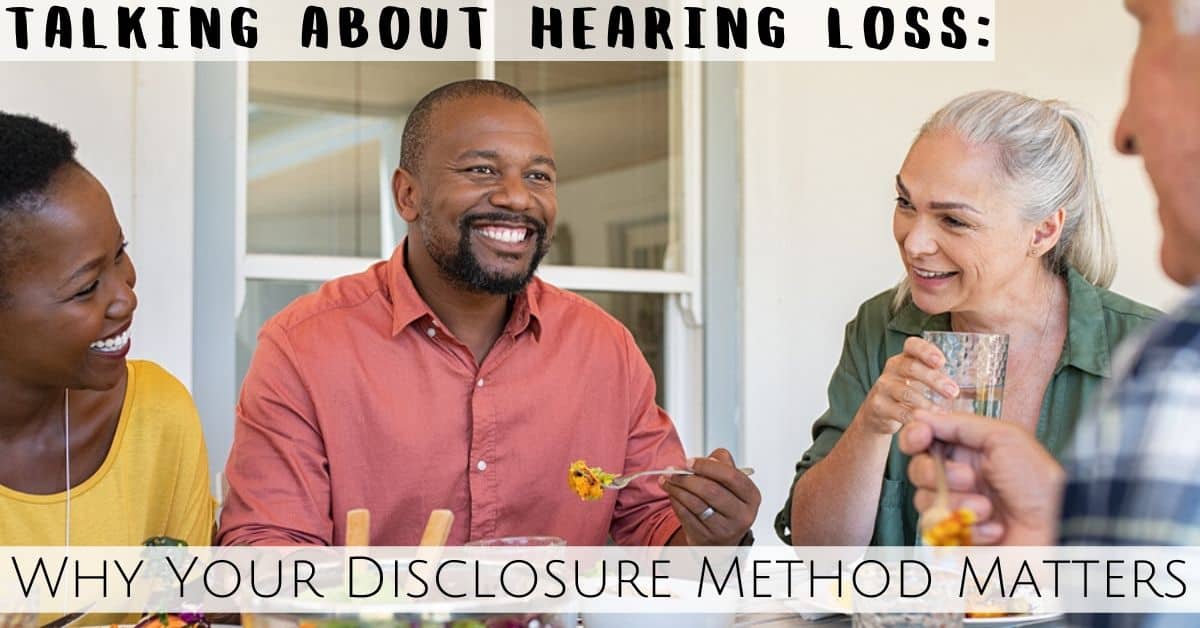- Strategies for Coping with Single-Sided Deafness - July 15, 2024
- How Summer Humidity Affects Hearing Aid Performance - July 3, 2024
- The Power of Body Language: Enhancing Communication for Those with Hearing Loss - June 28, 2024
Letting friends and family know about your disabling hearing loss can be difficult. You can get tips and information from your hearing health care professional, but it can be hard to explain it to others as you continue to learn about it yourself. You may also feel some embarrassment or shame, which can complicate disclosure even further. Take comfort in trusting that they are allies in your hearing health journey.
A Duke University study asked 337 participants about the phrases they used to tell people about their hearing loss. The data was organized into three categories by author Jessica S. West, M.P.H.
Nondisclosure: phrases that do not disclose hearing loss. “Can you please repeat that?”
Basic disclosure: phrases that disclose hearing loss through the term, a label, or details about the condition. “I have partial deafness. Can you speak more loudly, please?”
Multipurpose disclosure: phrases that disclose hearing loss and provide information to facilitate communication. “I wear hearing aids to help with my hearing loss, but it also helps me to read your lips when we talk.”
These codified disclosure methods help hearing health care professionals inform their patients about ways that their friends and loved ones might accommodate their hearing loss. It gives them a range of options to communicate how they feel most comfortable, and to avoid social isolation.
Benefits of Disclosure Methods
According to Hearing Loss Association of America (HLAA), there are an estimated 48 million Americans living with some degree of hearing loss and only 1 in 5 people who could benefit from hearing aids actually uses them. In an effort to shed light on this very common medical condition, the three disclosure methods offer help toward improved communication.
All of these methods offer benefits for effective communication, but multipurpose disclosure may be most advantageous in many situations. It discloses more personal information about your hearing loss, but it simultaneously sets up a system of support and accommodation for effective communication going forward. It is the fastest and most direct approach.
The study at Duke University found that women were more adept at disclosing their hearing loss when communicating with friends and loved ones. Statistically, they are twice as likely to use multipurpose disclosure than men. Women in the study also reported positive reactions to multipurpose disclosure saying it helped them feel supported and it helped improve communication.
Further Education Recommended
Hearing loss can be a very personal disability, not easily discussed in casual company. It can be a challenge to disclose your hearing loss to new people. However, when you take on the burden of listening harder or missing out on information, you put yourself at risk for other hearing loss-related factors like hearing fatigue and social isolation.
The Duke University study recommends hearing health professionals better educate their patients about various disclosure methods and be open to suggest accommodations for effective communication. The hearing loss population is often ‘invisible,’ despite the HLAA estimate for the U.S. and the World Health Organization’s estimate of 344 million people worldwide living with disabling hearing loss. This is to say that not everyone with disabling hearing loss wears a hearing aid or other device that might offer a visual cue to an observer. The National Institute on Deafness and Other Communication Disorders reports that approximately 16 percent of adults aged 20-69 who could benefit from hearing aids have never used them. Even when a hearing aid is worn, it may be so discreet or hidden that a method of disclosure is still the best course.
In more complex settings like school or work, disclosing hearing loss can actually simplify the experience. It can make conversing easier on a large scale with many people accommodating your needs, adjusting and adapting the ways in which they communicate. Speak with your teachers, instructors, or supervisors. There are likely already practices in place to help.
Using one of the disclosure methods may even shift your social habits. Loved ones might begin suggesting lunch in a park or quiet cafe rather than a bustling restaurant, or talking during a drive rather than listening to loud music.
These are just some examples of multipurpose disclosure and their potential long-lasting benefits. Whichever method serves you best, know that your hearing health care professional has information and strategies available to serve your needs.

